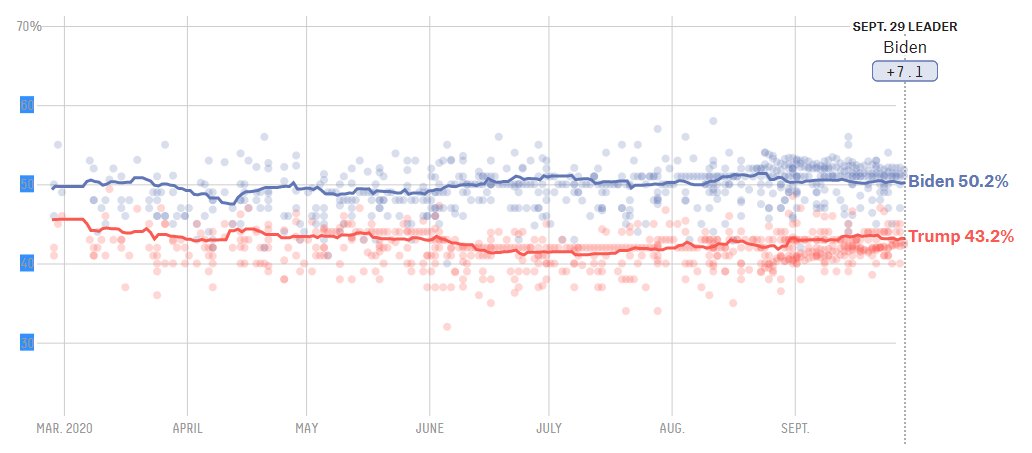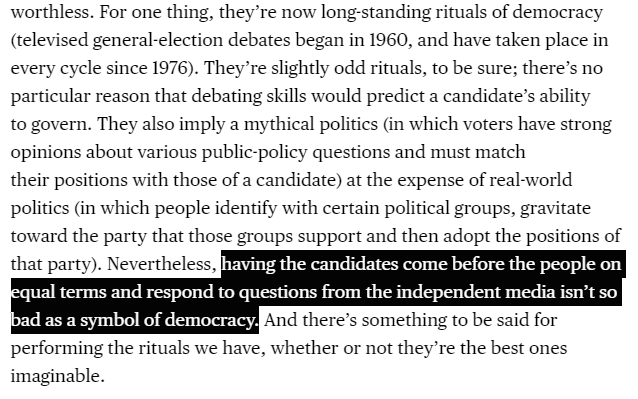Here& #39;s five political science-y things might want to know before you watch the debate tonight, in one quick tweetstorm.
1. There& #39;s very little chance these debates will significantly affect the election.
1. There& #39;s very little chance these debates will significantly affect the election.
Most voters have already made up their mind. Those who haven& #39;t tend to be people who won& #39;t watch the debate. Tons of policy enactments, scandals, campaign ads, and an ongoing pandemic that has killed 200k Americans hasn& #39;t moved this chart. You think a 90-minute debate will?
That isn& #39;t to say the debates have *no* effect on the horserace, just that the effects are rather indirect. They may set the media narrative for a few days or a week, or they may push candidates to respond next week with new policy proposals or campaign strategies.
2. Debates do, however, serve some useful purposes. For one, as @jbview likes to say, the are a decent "ritual of democracy." Despite the rise of hardball politics in the last decade, much of our democracy is still structured around good norms. Candidates debating is one of them.
3. More importantly, debates serve as deadline moments for campaigns. In order to debate, candidates must make choices about policy positions, policy priorities, and their governing styles and presentation. These choices matter; they will include or exclude certain interests.
Even more so, they put candidate on record making promises about policies, agenda, and governing strategies. Believe it or not, candidates tend to try to keep promises once in office. Their political strength depends on maintaining the coalitions they built in the campaign.
Think of it like the State of the Union address. That doesn& #39;t "matter" either with public opinion. But it forces the admin to make decisions about its agenda, which it an important part of the public policy process. Same with debates and campaigns. https://twitter.com/MattGlassman312/status/1092776398278791169?s=20">https://twitter.com/MattGlass...
4. The moderators tend to ask terrible questions. There& #39;s a two-fold problem here. First, many moderators love to ask "gotcha" questions, about anything except policy.
The best questions are simple and let the candidates provide the disagreement. https://twitter.com/MattGlassman312/status/1308510925079687168?s=20">https://twitter.com/MattGlass...
The best questions are simple and let the candidates provide the disagreement. https://twitter.com/MattGlassman312/status/1308510925079687168?s=20">https://twitter.com/MattGlass...
The second problem is that the debate questions almost always spend too much time on the legislative presidency---a shared power not the primary job of the POTUS---and too little time on the real job of the president, foreign policy and governance. https://twitter.com/MattGlassman312/status/1156726236183502849?s=20">https://twitter.com/MattGlass...
This is obviously a reflection of both how voters think of the presidency, and also how they care little about foreign policy and even less about exec branch governance. But as to how the job actually works, the president often spends the majority of his time on foreign policy.
It also fuels Green Lanterism--- @BrendanNyhan& #39;s term for the idea the president can will legislative policy positions into being from the Oval Office. He cannot, but you& #39;d never know it from the way they talk about "my tax plan" or "my health care plan." https://www.brendan-nyhan.com/blog/2009/12/the-green-lantern-theory-of-the-presidency.html">https://www.brendan-nyhan.com/blog/2009...
Here& #39;s the questions I& #39;d ask if I was moderating:
1. What’s your COVID policy for the next year?
2. Describe your foreign policy.
3. What agenda will you prioritize for Congress?
4. What do you look for in a SecState or WHCos?
2. Describe your governing/management style.
1. What’s your COVID policy for the next year?
2. Describe your foreign policy.
3. What agenda will you prioritize for Congress?
4. What do you look for in a SecState or WHCos?
2. Describe your governing/management style.
5. Questions about "who won" are really hard to answer, not just because the debate doesn& #39;t directly move opinion and only marginally alter the campaign, but because the candidates don& #39;t have the same goals in the debate.
For instance, if you have no name recognition or money and trail your opponent by 30 points, just getting on the same stage with them is a huge victory for you and a loss for your opponent, who never should have agreed to give you that sort of free media. https://twitter.com/MattGlassman312/status/1206584529365929986?s=20">https://twitter.com/MattGlass...
Obv, both Trump and Biden have plenty of $ and name recognition, but it doesn& #39;t mean they have the same goals tonight. Biden has a structural lead in the race; he might prefer a safe, forgettable debate that makes no news. Trump might like a series of wild, unpredictable moments.
Even more to the point, they probably aren& #39;t even speaking to the same audiences. An election is a zero-sum contest, but that doesn& #39;t mean we are trying to reach the identical set of voters with our persuasion or agenda setting appeals.
This makes asking individual voters what they thought about the debate sort of worthless. The question is often more about how separate groups each candidate was targeting responded to their appeals.

 Read on Twitter
Read on Twitter



